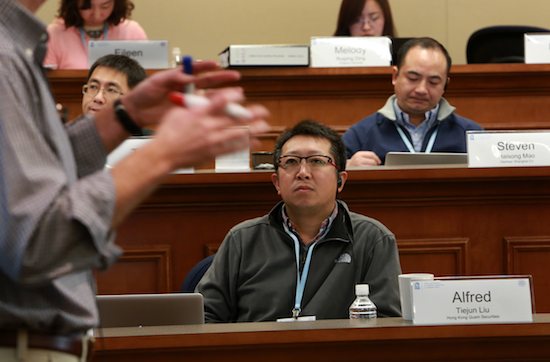
Chinese students, such as Tiejun Liu, who goes by Alfred, adopt English names during the University of North Carolina’s program with Tsinghua University.
Why would Ning Zhai fly more than 7,300 miles across the world to Chapel Hill, North Carolina, for business classes?
The 37-year-old already has an MBA and a successful career as the general manager for EasyWay Electronics, a high-tech manufacturer in Shanghai.
But Zhai, who also goes by Amy, recognized that Asia’s business climate was changing. She believes she needs fresh knowledge about manufacturing, global supply chains and international markets to stay competitive. So she enrolled in the Global Supply Chain Leaders Program, a dual-degree executive MBA program by the Kenan-Flagler Business School at the University of North Carolina and Tsinghua University in Beijing.
“I was young when I got my first MBA,” she says, “but after working, I felt this program would improve me professionally. It would help improve my thinking from an international viewpoint.”
CHINA’S RAPID GROWTH SPARKS SHORTAGE OF MANAGERIAL SAVVY
Zhai isn’t the first Chinese executive to turn westward for an executive education. The demand for advanced business degrees is growing among Asia’s professional set, and increasingly American and European business schools are partnering with institutions in the East to offer executive MBA and other programs. China’s rapid economic development sparked a series of growing pains, including a shortage of managerial talent. Asia’s ambitious businesspeople are eager to fill the void and enrolling in EMBA programs – helping to fuel the demand.
The Kellogg School of Management at Northwestern University teamed up with the Hong Kong University of Science and Technology to offer an executive MBA program that has snagged the top spot in the Financial Times’ EMBA rankings four years in a row. Each month, Washington University in St. Louis puts business school faculty on airplanes to fly to Shanghai to teach executive MBA students at Fudan University. More than 600 have already graduated from the program. The B-schools at University of Maryland and Arizona State University are among a handful of other American institutions that have established ties with China to offer EMBA programs. B-schools in other countries have also embraced the trend. INSEAD and the University of Western Ontario in Canada offer Chinese executives another opportunity to grab an international EMBA.
UNC’S FIRST CHINESE EMBA CLASS AVERAGES 21 YEARS OF WORK EXPERIENCE
The UNC-Tsinghua program welcomed its first class of 24 Chinese executives, including four women, in October 2012. Similar to Zhai, the majority are experienced professionals – they average 21 years of work experience. For one-third of the program, students attend class in Shanghai once a month from Friday to Sunday. The remaining portion is taught through global residencies and two 16-day sessions in Chapel Hill.





Questions about this article? Email us or leave a comment below.